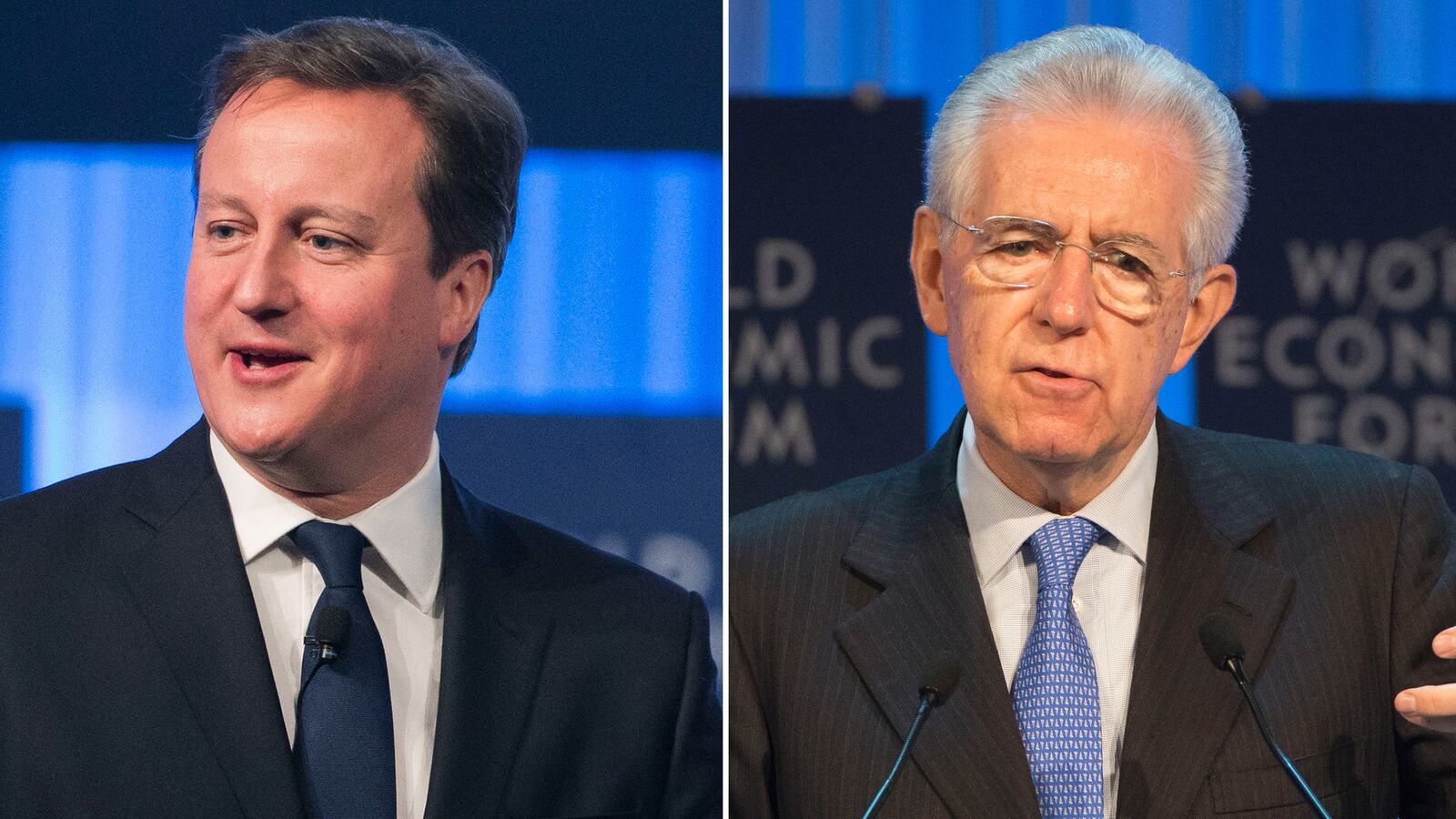This is the first World Economic Forum in at least six years that hasn’t been gripped by a financial crisis. The giant banks are shrinking their footprints and workforces, but they’re not falling. To those without a Bloomberg or Reuters terminal, government bond markets have become boring again, as interest rates on Italian, Spanish, and Irish bonds have fallen to acceptable levels. The hedge-fund managers are schmoozing, back slapping, and scheming about deals, not fingering blackberries and iPhones like worry beads. “There’s no doubt the tone is generally more positive,” said the guy in the parka strolling down Promenade, the main drag of Davos. It was Michael Dell, the founder and CEO of Dell, Inc.

Europe’s financial system is still battered. But the bailouts of Portugal, Ireland and Spain, the agony of Greece, the prospects of economic shrinkage in Germany and the U.K. don’t seem to be high on the agenda. To a large degree, the bailouts—the funds provided to Spain, Greece, Ireland, and Portugal by the International Monetary Fund and European Central Bank, and the ECB’s promises to purchase Italian bonds—seem to have stopped the panic. The expectation now, as IMF Managing Director Christian Lagarde said at a Newsweek and The Daily Beast event on Wednesday, is that “the policy decisions that stabilized the financial markets are going to translate into the real economy.”
“Just because there is no talk of the euro failing and countries leaving the Euro doesn’t mean there should be complacency,” said Enda Kenny, the taoiseach of Ireland, at a panel on Thursday.
But there was plenty of complacency and self-congratulation on display. Mario Monti, the banker who helped lead Italy through last year’s financial crisis as a technocratic prime minister, took a victory lap. On Wednesday, he told the Davos crowd—his crowd—that Italy had regained the confidence of the world’s investors, thanks in large measure to the hard work of his country’s stoic citizens.
The U.K. may be teetering on the edge of yet another recession. But you wouldn’t have guessed it from Prime Minister David Cameron’s muscular, direct speech on Thursday. He boasted about cutting his country’s deficit, keeping business taxes low, and recommended other developed countries do the same. He didn’t say much about the urgency for growth, or the failure of his country to regain its pre-crisis economic peak.
Clearly, success has been redefined somewhat for European financial leaders. Flat is the new up, and not falling on your face is the new definition of success. A “C” is the new “A.” As Klaus Schwab, the maestro of Davos, put it: “We passed the exams last year without failing, but we still have a lot of homework to do.”
So, what are self-satisfied European leaders and the forgiving bond markets overlooking? Plenty, says Barry Eichengreen, professor of economics at the University of California at Berkeley and a prescient observer about the frailties of the Euro. “It’s a total no-brainer that the crisis will be back in 2013,” Eichengreen told me in the buzzing Congress Center. “The underlying issues haven’t been solved.” The much-discussed moves towards a European banking union (a common regulator for all the continent’s banks) aren’t really happening. There isn’t much growth to speak of.
The action in the bond markets—the falling interest rates on the debt of struggling government—is more a function of psychology than rational response to improvements on the ground, Eichengreen said. “Markets are bipolar. They were depressed last year, and now they are euphoric. And one day they will wake up and be depressed again.” The problem is that the politicians and policymakers have been convinced by the markets that they’ve fixed Europe’s problems. Eichengreen suggests the Euro-optimists are yodeling past the graveyard.
Take, for example, the vital issue of employment and unemployment. At Davos, there is no unemployment, by definition. You don’t come here if you don’t have a job. But while there are sessions devoted to growth, job creation doesn’t seem to be high on the agenda. I haven’t heard many convincing words about how Spain, Italy, Portugal and Greece can make a dent in their double-digit employment rates. Leaders here tend to speak about unemployment with the same dispassion that they talk about energy efficiency or outsourcing. “Our big burden right now is youth unemployment in Europe,” said German Prime Minister Angela Merkel in her speech on Thursday. But instead of proposing a plan, she asked the corporate titans and financiers assembled before her to pitch in and spitball some ideas. “We are welcoming anybody with open arms who gives hope to young people.”
As a wise person once said, hope is not a plan.






